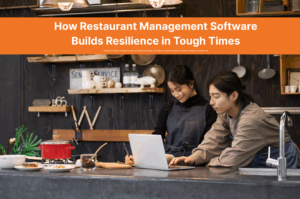Updated on: February 3, 2025
The events of the past several years have been hard for everybody. High turnover rates and health insurance premiums due to Covid-19, shut downs, fiery debates over public health policy and a general sense of anxiety among other things have left a lot of people’s nerves frayed and the hospitality industry a tight labor market.
If you’re a restaurant owner, you probably have had a more intense and uncertain experience than most. The pandemic ravaged the food and beverage industry. Unfortunately, for those businesses that survived, the challenges of the food service industry haven’t stopped even as the pandemic winds down. Even in places where restaurant operators can reopen the doors for business, you are probably having a very hard time filling positions at your restaurant. You’re not alone. There is a restaurant staff shortage in the country and it is making it difficult for restaurants to stay in business.
So what’s given rise to this unprecedented restaurant labor shortage? Some have pointed to the increased benefits from the state given to unemployed workers during the pandemic. This is certainly a contributing factor. Between benefits from the federal and state governments, some workers make comparable amounts of money staying home as they do going to work.
But there is much more to it than that. Labor recruitment and retention has been an issue for the food and beverage industry for some time and the challenge predates the pandemic. The pandemic and accompanying shutdown merely shook things up to the point that restaurant workers have been able to exit the industry with no intention of returning to their restaurant jobs. The ongoing labor shortage is as much a result of people moving to new industries as it is workers staying home. The fact of the matter is, restaurant workers have a litany of grievances about the state of restaurant jobs that have been overlooked for some time. Restaurant owners don’t have to be chief economists to solve the employee retention challenge. Knowing and addressing potential employees’ concerns is key to establishing your place in the food service industry during a persistent restaurant worker shortage. Learn from these examples.
Why have workers left the restaurant industry?
Let’s jump into some more specifics on why workers have left the restaurant industry.
The work can be very hard
The demand for a perfect dining experience continues to grow without waiting for job openings to fill, so existing food service workers have to work harder than ever to create a meaningful customer experience. In both full-service restaurants and quick-service restaurants, line chefs have to prepare many different dishes in a short period of time. Wait staff and hosts have to seat, service and be prepared to handle issues from multiple diners and parties during their shifts. These workers spend most of their shifts on their feet moving around restaurants while balancing trays of food and beverages and scanning other tables to make sure that everybody is happy. The pandemic introduced mobile app ordering for more businesses, but also even higher customer demand limited staff must fill. This is a lot of work and it can burn out even the most experienced house staff very quickly! Especially if they’re already unhappy at work.
The hours can be rough
It’s the nature of the service industry. When the rest of the population isn’t working, the restaurant workforce still is. Restaurant workers work on weekends, they work early mornings and late nights. They have huge surges of customers during meal time rushes. Restaurant workers manage large crowds on holidays and other special events, all with excellent customer service. This dynamic means that restaurant workers are working when the rest of us are relaxing. That’s all well and good but this can cause stress, fatigue and burn out for service workers and restaurant employees. Especially when they do not feel like all of the labor is worth it which leads us to our next point.
That’s all well and good but this can cause stress, fatigue and burn out for service workers. Especially when they do not feel like all of the labor is worth it which leads us to our next point.
The people can be rough
To be sure, most customers are polite and respectful to restaurant workers. But some are not. The ones who mistreat restaurant staff can be quite abusive, making working in the food service industry a great emotional and physical risk many may not be up to take on. Virtually every restaurant worker has their share of “war stories”, customers who yelled at them, belittled them, harassed them, started throwing or smashing objects or even physically attacking them! Restaurant workers are expected to deal with a level of abuse from unpleasant people that people in other industries are not. This can be highly corrosive to morale and self-esteem especially if the restaurant worker does not feel like they have support or protection from their employer, let alone competitive wages or benefits to compensate for it.
The compensation just is not that good
Food service employees are famously not paid well. Virtually all service workers are paid hourly wages. In many restaurants, hourly wages are lower than other service industry sectors but can be made up for with gratuity. Serious job benefits, like insurance, 401k’s and paid time off are almost non-existent in the food service sector, impacting restaurant employment as willing workers simply cannot live on less than minimum wage or with a lack of benefits.
It just feels like a dead end
Many restaurant workers feel like their jobs are not taking them anywhere in terms of career development and advancement.
They’re mostly correct. Celebrity chefs like Gordon Ramsey are not common and it’s unlikely that a line cook in a diner is going to achieve that level of fame and wealth, no matter how good they are at their job.
Additionally, many workers from the millennial and zed generations place a premium on the extent to which their jobs give them a sense of meaning and purpose. Many do not feel like fixing sandwiches or busing tables makes the world a better place or moves them meaningfully along desired career paths.
Do not misunderstand. You humble author is not suggesting that anybody reading this blog entry is intentionally mistreating or neglecting their employees. If you are the sort who would take the time to even read this, you are probably the type of employer who cares about your workforce and does your best to do right by them! Indeed, you probably wish you could do a lot more for workers who you recognize are absolutely vital for the success of your restaurant.
The current restaurant staffing shortage is caused by many factors, many of them outside of your control. You and other restaurant workers are simply constrained by certain economic realities and high labor demands.
You may have a very talented chef who makes a burger or a plate of pasta that people will go out of their way to come and eat. Or perhaps you have a particularly charming waiter or waitress who has a knack for making sure your guests feel at home in your restaurant and keeps them coming back for the food and that feeling.
You probably wish you could pay your kitchen staff and house staff much more and offer benefits to keep them around but, as you well know, the restaurant industry is one of fierce competition and very tight margins. Sometimes the money to do that sort of thing simply is not there.
So what to do? If your restaurant is suffering from a staffing shortage, how can you bring talented staff to your restaurant and keep them there? Here are a few ideas.
How to retain restaurant staff
Take care of your people
It is the unfortunate tendency for many employers to take their staff for granted when they know that there is a large pool of workers that they can tap on demand. For minimum wage labor like restaurant work, this can be especially common. The economy is always changing. Demographic shifts fill the hospitality job openings. Cheap labor has been abundant in the past and will likely be again in the future. The current restaurant staffing shortage will eventually come to an end. However, restaurant owners would do well to make sure that they have an attitude of appreciation for their employees, especially the ones who consistently show up and do their best work. How are some ways that you can do this?
Money
Everybody likes money. Everyone is doing their best to find some semblance of financial health. As mentioned above, margins in a restaurant can be very tight. If at all possible, find a way to increase compensation for your employees, especially ones who are particularly able and have been working with you for a while. There is no exact science to this, but it is generally accepted that one experienced and motivated employee is worth more than a few who are inexperienced and unmotivated. Paying the one more can make your operation more efficient and cost effective in addition to providing better customer service.
Benefits
This one is hard, we get that. Even modest employer benefits programs can be very expensive. Even if you’ve dismissed it in the past, reconsider a benefits package that your business can afford. Consult with an insurance provider to see what options you may have. Short of that, you might consider developing a site-specific performance based incentives package for your restaurant. PTO based the number of hours worked, free food during a shift or annual bonuses just to name a few ideas.
Employee feedback
Some of the best insights that you will ever get on your restaurant, its menu, its clients, you as an employer and the unique problems that you have to address will come from your employees!
Viewing them as a resource for insight and feedback will not just benefit you, but will make them feel more appreciated and involved. Take the time to talk with each of your employees individually. Get to know and care about them. Coach them by giving them feedback and constructive criticism and sincerely invite it from them in return! Follow up on questions and concerns that your employees have and make sure they know that you have their back.
When employees leave, conduct exit interviews with them and record the data for future use in hiring, training (and retaining) future employees. For the diligent restaurant owner, investing in people isn’t just an investment of money, it’s an investment of time. Talking with your employees, getting to know them and making sure that they know you are concerned for them and making them happy at work will make them better and happier employees.
Introspection
Take careful stock of your restaurant. Ask yourself if it is the sort of place that you’d like to work as a laborer. If you come up with issues, fix those issues. If you can honestly say that there aren’t any serious ones then nevertheless look for ways to improve.
One good way to personally avoid a restaurant staffing shortage at your business, and survive one when it happens, is by making sure that your restaurant is a good place to work. Always be asking yourself questions about how you can be a more attentive boss and how you can make your restaurant a good place to work. Remember that a happy staff will help your customers to have good experiences. Good experiences and good food will keep them coming back and get them to start recommending your restaurant to their family, friends, coworkers and other associates.
Consider using technology as a tool
There is a very old saw out there that goes something like this: “Necessity is the mother of invention.” Going forward, many restaurants may need to survive by adapting to a reality where there is a smaller and more particular pool of labor for them to draw from. One form of “invention” derived from this “necessity” is the adoption of new restaurant technology to replace certain labor.
Unless you own a successful chain of restaurants that operate across the country, you probably won’t have the money for a hamburger flipping robot anytime soon. However, for example, you can probably afford some tablets and software that enable your customers to order from their tables, at self-service kiosks, from their vehicles, or somewhere off site entirely. This can reduce the number of wait staff that you need to have on a shift. This also enables the wait staff you do have on the clock to dedicate more time to customer service, ensuring that your customers are comfortable, happy and feel fully attended.
Having a staffing shortage at your restaurant? These tips are not exhaustive but they can help. Ultimately it will be up to you to figure out what and how to implement them. We can help. We offer a range of software solutions that can help you to manage HR, labor and scheduling, and analytics. It’s your restaurant and they’re your employees, but we can help you make your restaurant a better place to work and a better place to eat.






